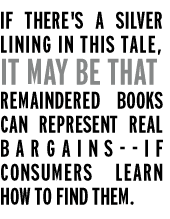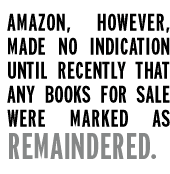| |||||||||

Why it pays to read the fine print
 Online retailer Amazon.com sold books that had been marked by publishers as "remaindered," or discontinued, without disclosing that the books weren't in new condition, until a consumer outcry forced a change last month. Online retailer Amazon.com sold books that had been marked by publishers as "remaindered," or discontinued, without disclosing that the books weren't in new condition, until a consumer outcry forced a change last month. Joe Dixon is an Amazon customer who had a particularly frustrating experience. He ordered in June four copies of The Clickable Corporation, a 1999 book about businesses using the Internet, to give to friends as gifts. When the books arrived, he found that the bottoms of the pages were defaced with a bold black stripe from a felt marker. Thinking that the books had been damaged in some way, he returned them to Amazon, which sent him another four copies. When those books also arrived with black markings on the bottom, he returned them also. But like the Bill Murray character in the movie "Groundhog Day," who was forced to relive February 2 over and over, Dixon received yet another four books, again in the same condition. When Dixon made inquiries of Amazon's customer relations staff, he said, "I spoke with an 'order specialist' who informed me that 'at Amazon, we do not sell used books.'" Amazon does, in fact, offer used books--but the books Dixon received had never been used. Instead, they were uncirculated books that had been literally "marked down" by the book publishers themselves. The black felt markings are one way publishers show that a book is not to be sold as new. Other publishers use a rubber stamp to ink the word "REMAINDERED" onto the bottom of each book. Such books are being taken "out of print" by publishers. Booksellers can buy such books for a fraction of the normal wholesale cost. Brick-and-mortar bookstores typically unload their copies in a "bargain bin." Amazon, however, made no indication until recently that any books for sale were marked as remaindered. The prices were attractive--in some cases, Amazon sells remaindered books for 80 percent off the list price--but such disfigured volumes hardly qualify as respectable gifts or coffee-table fare.
Kristin Schaeffer, an Amazon spokeswoman, said in an interview that remaindered books have been part of the e-tailer's main selections since December 2000. She said that a new "bargain books" information page was posted last month in response to consumer complaints. In addition, all remaindered books offered on Amazon pages are now identified as bargain books with a link to the information page. Schaefer said she didn't know how many Amazon customers had purchased remaindered books before the policy change. Sharp-eyed shoppers should look carefully at Amazon for an explanatory link lest they order a black-bottomed book. If there's a silver lining in this tale, it may be that remaindered books can represent real bargains--if consumers learn how to find them. Glenn Fleishman, the owner of ISBN.nu, a shopping "bot" that compares prices at different online booksellers, says he's made an effort to include cut-rate e-tailers among the giants. He says he recently added to his listings Surplus Computer Books, a site which specializes in "overstock" that's being unloaded by publishers. The e-commerce site recently offered, for example, the Microsoft Windows 98 Resource Kit, a huge reference book with a list price of $69.99, for only $27.98. Because publishers sometimes dispose of books that have water spots or other damage, Fleishman says he particularly likes the way the surplus store describes the condition of each book, from "excellent" to "fair." "They put it up at the top," Fleishman said, "and they include a link to a longer description so you don't have to guess what it means." Publishers seem to have a lot more computer-themed books on hand these days than they expected, so the bargains are only likely to increase. It's sometimes said that the Internet will kill off printed books, but in the meantime many e-businesses are dependant on selling them. Brian Livingston's Wired Watchdog column appears at CNET News.com every Friday. Do you know of a problem affecting consumers? Send info to tips@BrianLivingston.com. He'll send you a book of high-tech secrets free if you're the first to submit a tip he prints. biography |
|
|||||||||||||||||||||||
|
Send us news tips | Contact Us | Corrections | Privacy Policy |
|

